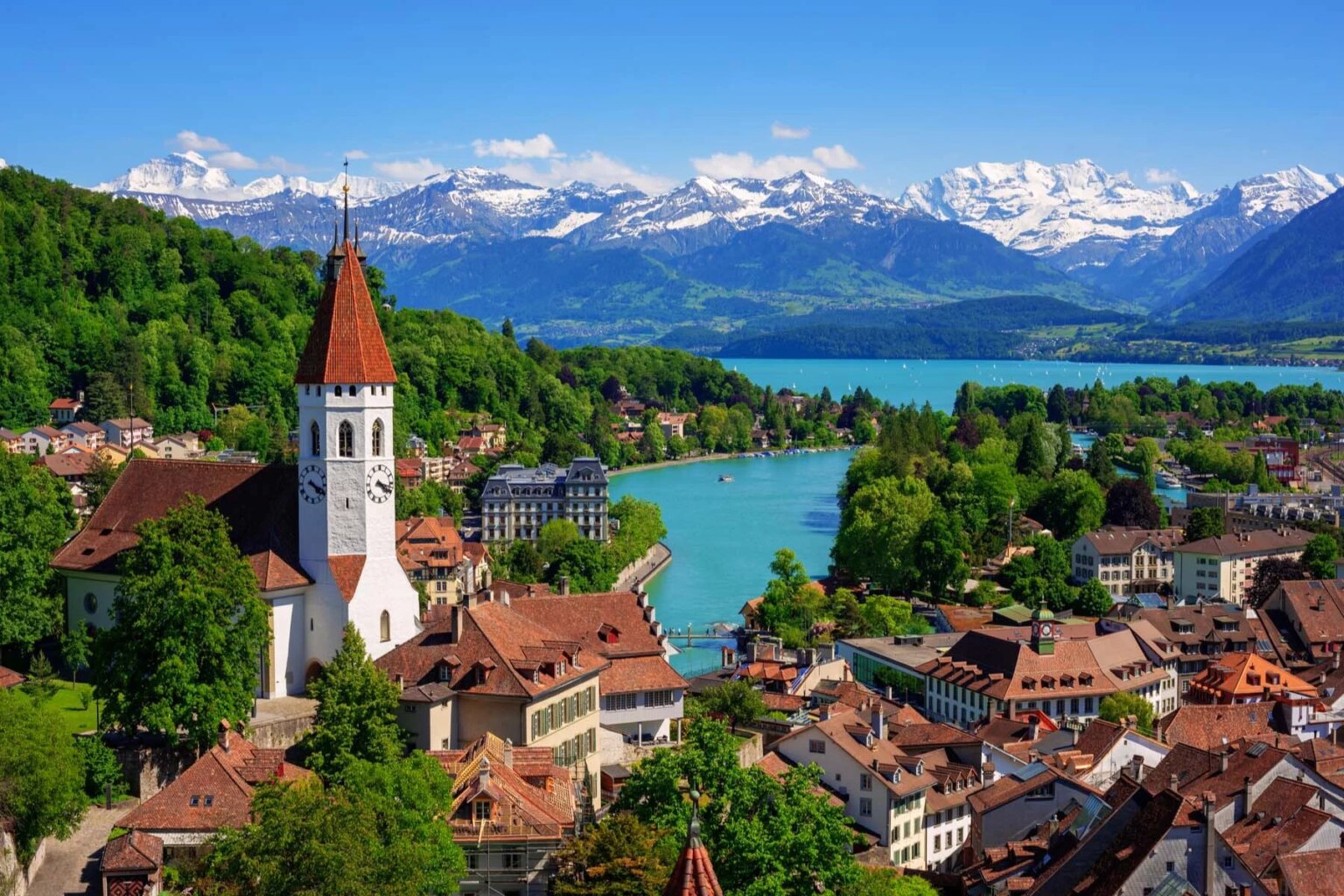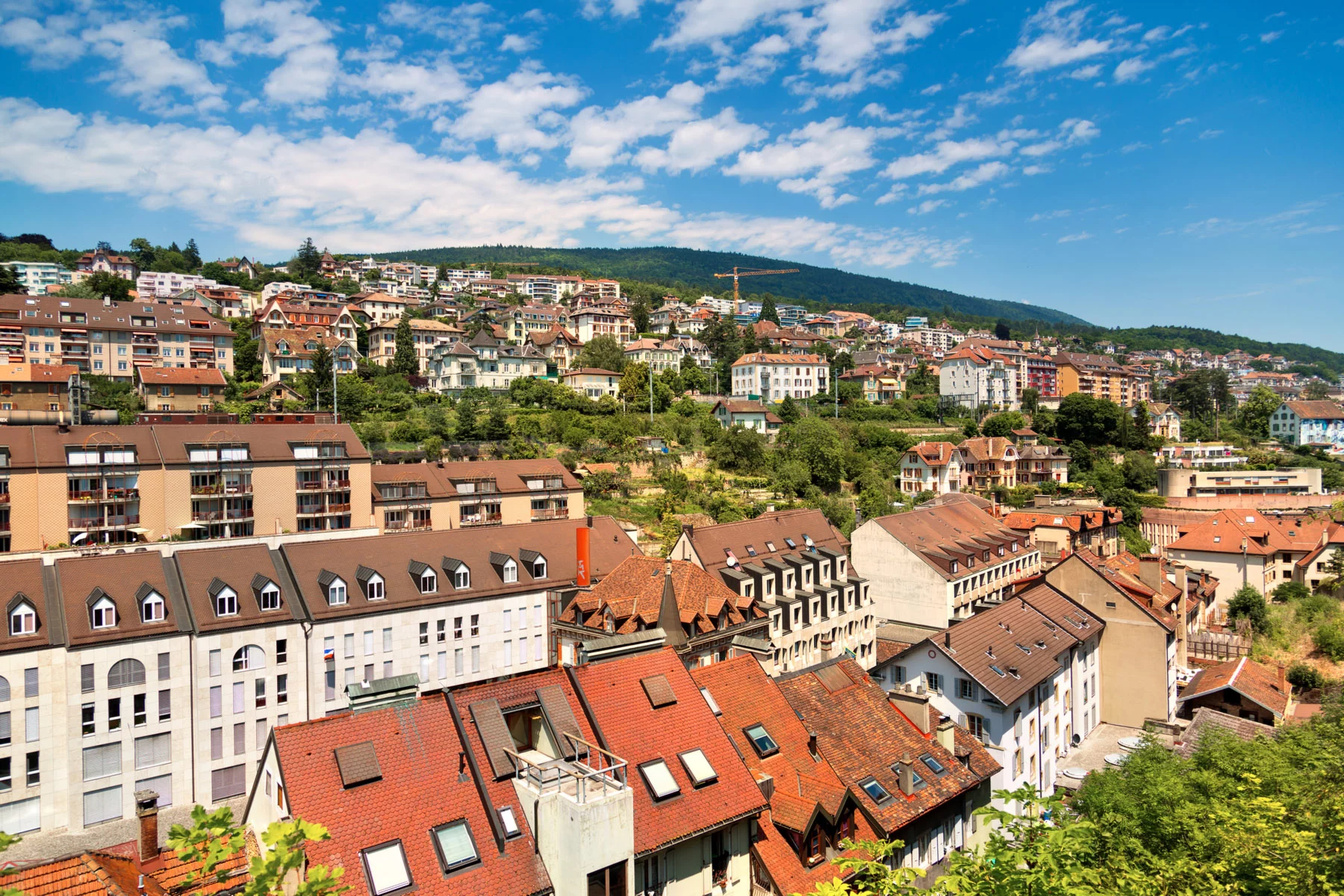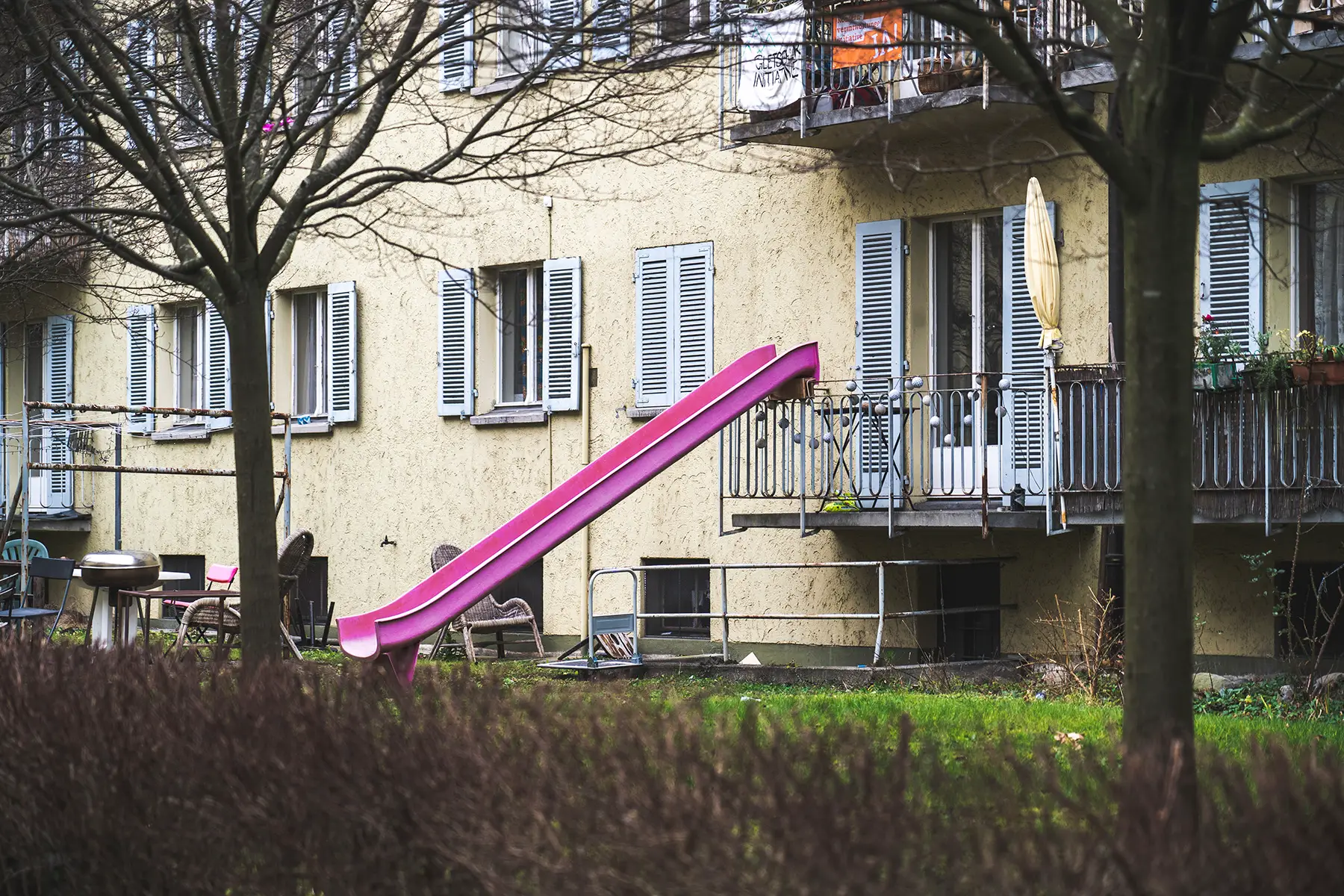Switzerland is a dream destination for many expats, offering stunning landscapes, a high quality of life, and a strong economy. But living in this alpine paradise comes at a steep price.
Cities like Zurich and Geneva consistently rank among the most expensive in the world, with housing, groceries, and services costing much more than in many other countries. So, before making the move to Switzerland, it’s essential to understand the cost of living and start budgeting accordingly.
Keep reading for more info on these topics:
Alao
Find the perfect Swiss mobile, internet, or TV package with just a couple of clicks. Alao let you compare hundreds of cellphone and home internet plans to find one to fit any budget. They also offer exclusive deals and advice seven days a week. Top mobile and internet deals are at your fingertips with Alao.
Is Switzerland’s economy good?
Switzerland has one of the strongest and most stable economies in the world. It consistently ranks among the top countries in terms of GDP per capita, economic competitiveness, and financial stability. The country benefits from a diverse and highly developed economy driven by key sectors such as finance, pharmaceuticals, precision manufacturing, and technology.

Switzerland’s economy is characterized by low unemployment rates, high wages, and a strong currency (the Swiss franc, CHF). It also boasts one of the world’s highest GDPs per capita (over CHF 90,000 in 2024), reflecting a high standard of living.
Additionally, Switzerland consistently ranks at the top of the World Economic Forum’s Global Competitiveness Index, thanks to its innovation, infrastructure, education system, and skilled workforce. While the cost of living is high, Switzerland’s economic resilience, strong trade relationships, and low debt levels contribute to its reputation as one of the world’s most prosperous nations.
Inflation and disposable income in Switzerland
Overall, Switzerland’s inflation remains low, and the Swiss National Bank is actively adjusting monetary policy to maintain price stability. As of January 2025, Switzerland’s inflation rate has decreased to 0.6%, down from 0.7% in November 2024. The Consumer Price Index (i.e., prices paid by consumers) is also in decline.
The country has a reputation for high pay – average salary in Switzerland is about CHF 59,000 (2025), well above the OECD average. The country also has a higher employment rate than most OECD countries.
Switzerland compared to its neighboring countries
The average Swiss household expenditure is considerably higher than neighboring Germany, France, Italy, or Austria. This applies across the board, including money spent on food and groceries, housing, and transportation.
The cost of living in Switzerland in 2025
The price of groceries in Switzerland
Beer, wine, and liquor
In Switzerland, the cost of alcoholic beverages in grocery and liquor stores varies based on the type and quality of the drink. A 50cl beer can cost between CHF 1–4.00 while you can find a bottle of wine for as low as CHF 3.00 or as much as CHF 40.00. Mid-shelf liquor usually costs about CHF 20–25.00 for 750ml.
Food and non-alcoholic drinks
Monthly supermarket bills vary widely depending on the household size and preferred brands, though food in Switzerland can be expected to be around 20–30% higher than other European cities, with prices being highest in Zurich and Basel. Residents should budget around CHF 600 per month per person for grocery shopping.
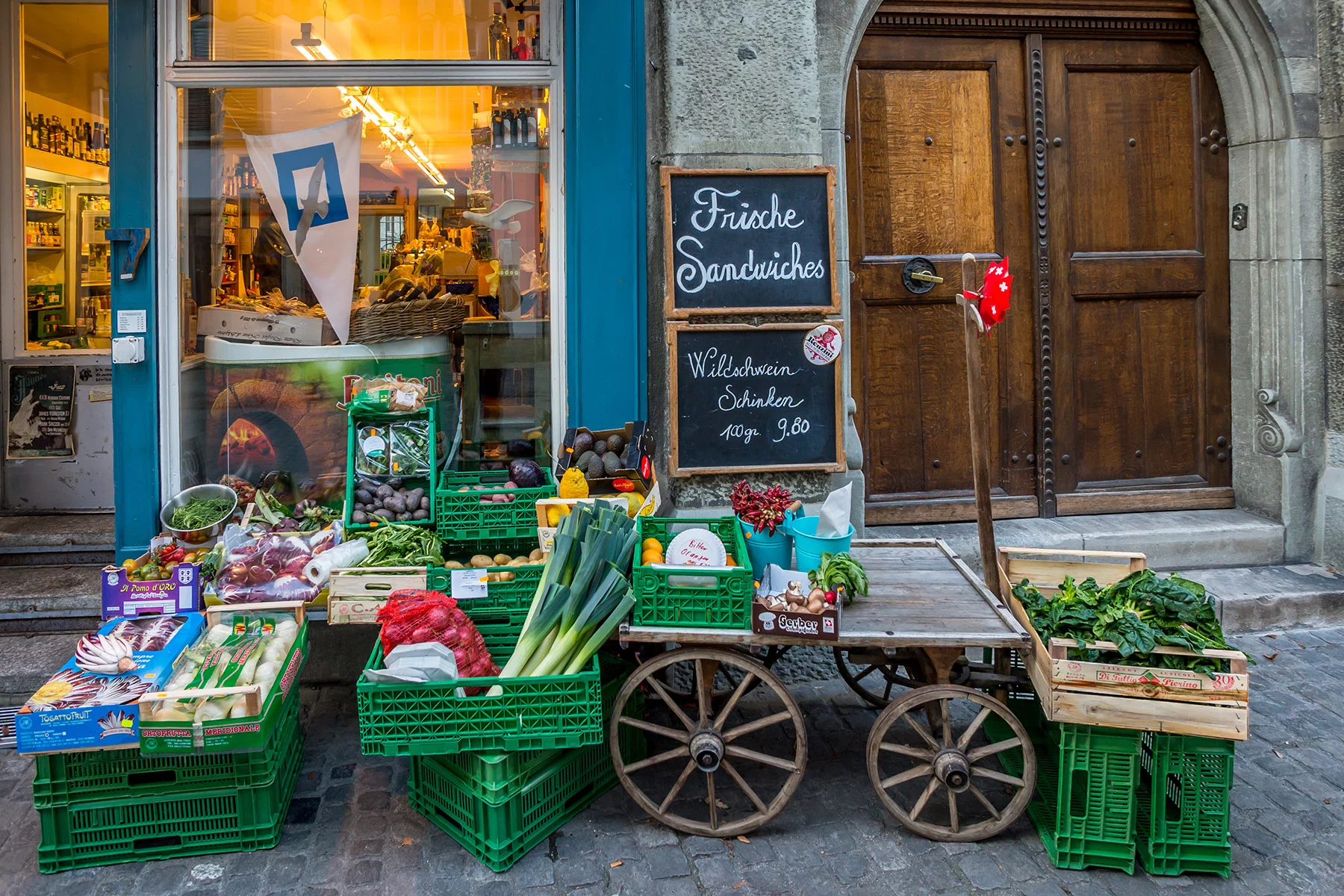
It’s worth noting that meat prices specifically are very high in Switzerland due to effects of the Swiss Animal Welfare Act. In fact, the price of chicken and beef can be up to 2.5 times as high as in neighboring Germany.
Here are some average prices of typical items in 2025:
| Product | Price | Product | Price |
| Apples (1 kilo) | CHF 2–5.00 | Chicken (1 kilo) | CHF 12–35.00 |
| Bread (1 loaf) | CHF 1.50–4.50 | Regular milk (1 liter) | CHF 1.20–2.00 |
| Cheese (1 kilo) | CHF 16–45.00 | Rice (1 kilo) | CHF 1.70–4.95 |
| Eggs (12) | CHF 3.48–8.40 | Tomatoes (1 kilo) | CHF 2–7.90 |
| Beef (1 kilo) | CHF 25–70.00 | Water (1.5 liters) | CHF 0.60–2.00 |
Household and hygiene products
The average price ranges* of hygienic and household necessities include:
| Product | Price range | Product | Price range |
| All-purpose cleaner (1 liter) | CHF 2.50–7.00 | Shampoo (100 ml) | CHF 1.00–3.50 |
| Deodorant (100 ml) | CHF 2.50–6.00 | Soap (1 liter) | CHF 3.00–6.50 |
| Dish soap (1 liter) | CHF 2.00–5.00 | Tampons (per tampon) | CHF 0.20–0.50 |
| Garbage bags (per bag) | CHF 0.10–0.50 | Toilet paper (per roll) | CHF 0.50–1.50 |
| Laundry detergent (per wash) | CHF 0.30–1.00 | Toothpaste (100 ml) | CHF 2.00–7.00 |
Swiss housing costs in 2025
Less than half of households in Switzerland own their homes. In popular expat hangouts like Zurich, Geneva, and Bern, high demand means the best rental apartments come with many requirements, including up to three months’ deposit upfront.
Rent and property prices
Depending on the location, you’ll pay the following average housing prices in city centers:
| Monthly rent (1 bedroom) | Monthly rent (3 bedrooms) | Property price (per square meter) | |
| Zurich | CHF 2,244 | CHF 3,953 | CHF 22,017 |
| Geneva | CHF 1,908 | CHF 3,855 | CHF 16,450 |
| Basel | CHF 1,648 | CHF 3,000 | CHF 11,162 |
| Bern | CHF 1,312 | CHF 2,508 | CHF 11,960 |
| Lausanne | CHF 1,560 | CHF 2,800 | CHF 15,800 |
The Swiss government also imposes restrictions that make it harder for non-nationals to buy property in Switzerland, as well as residents who are not EU nationals or holders of a permanent Swiss residence. It’s not impossible but can cost more because temporary residents may be required to purchase a license.
Utility bills: water, gas, electricity
Some Swiss landlords include basic household utilities, such as electricity and water, in the rental prices, typically around 15–20% of rent. However, most Swiss residents pay their own utilities. Online surveyor Numbeo puts average basic utility costs for an 85 square meter apartment at around CHF 220 per month. Gas is rarely used in Swiss households because of extreme sourcing costs.
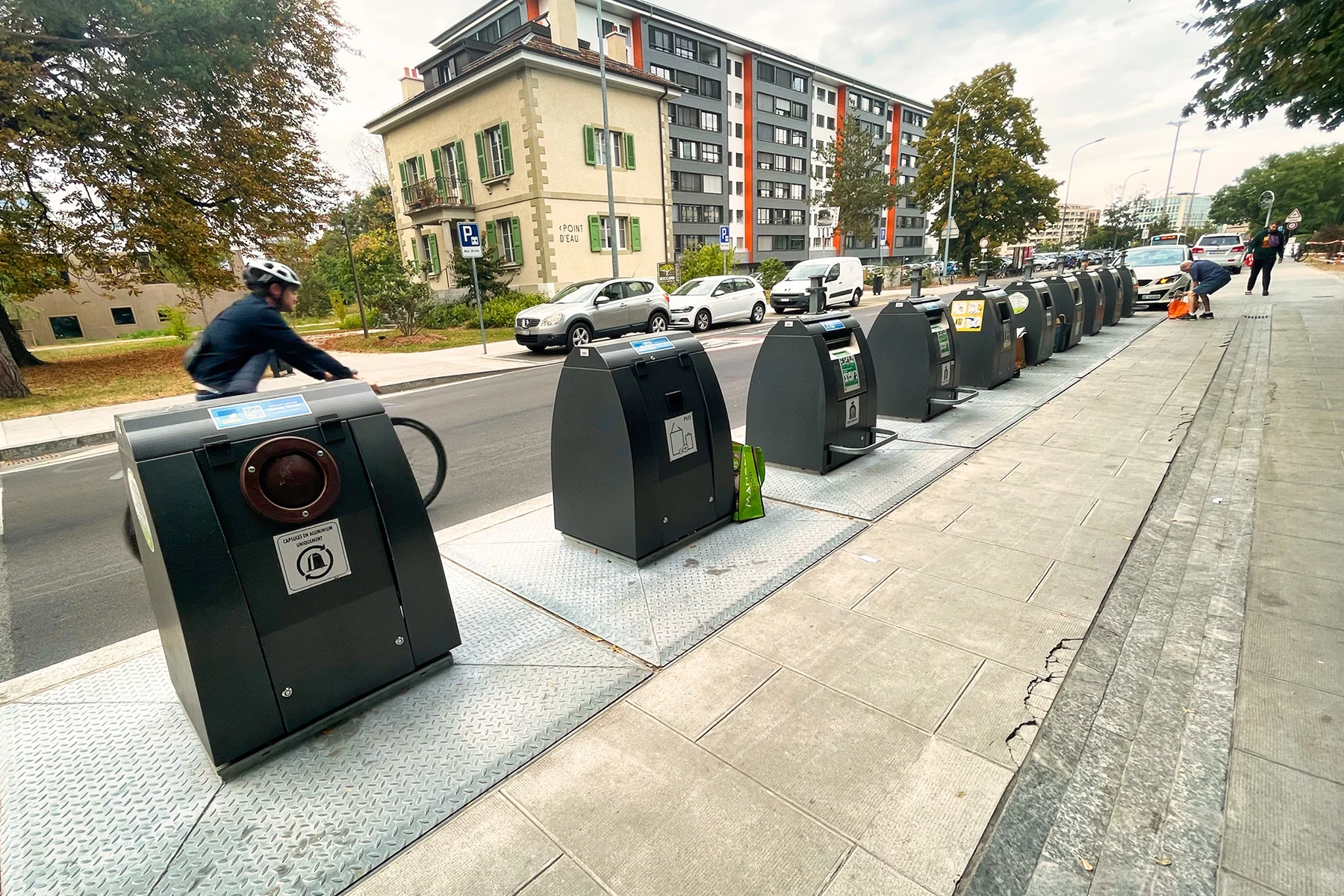
In addition to accommodation costs, residents are also obligated to pay a fee for garbage disposal. The monthly cost depends on the size of the bags and differs slightly between municipalities. Recycling is taken very seriously in Switzerland and local councils have strict rules. Break them and you could receive a big fine or even a two-day stay in the local prison.
Healthcare costs in Switzerland
Basic healthcare insurance is compulsory in Switzerland and can be expensive, although it does provide access to one of the best healthcare systems in the world.
The average health insurance premium costs CHF 378.70 a month in 2025, although you can find health insurance packages for less. Low-cost insurance plans, however, can quickly leave you with a bill you weren’t expecting to pay.
Price rises can vary greatly each year depending on the insurer’s and canton’s economy, which are announced by the Federal Public Health Office (OFSP). The government provides a tool to compare prices between areas (available in German, French, and Italian).
Internet and telecom prices in Switzerland
Telecoms are privately owned and offer all-in packages which sometimes reduce the overall cost of TV and broadband internet in Switzerland. Numbeo puts average internet costs at around CHF 50 per month, but you might be able to find cheaper options. There is also a television and radio fee of around CHF 335 per year for any household or company with a television or radio.
Clothing and shoes
Just like almost everything else in Switzerland, clothing is expensive. It has the highest price level index compared to other European countries. For example, a pair of good-quality jeans will set you back about CHF 111 and a summer dress from a chain store costs about CHF 58.
The price of Swiss transportation
Public transport in Switzerland
Happily, public transport in Switzerland is widely available. However, it’s not the cheapest in Europe. If you intend to live in one of the major Swiss cities, you can expect to pay from CHF 80 a month for a travel pass. Tickets are valid on trams, trains, buses, and ships. Single fares are around CHF 3.50.

Driving and private vehicle costs
Taxis demand a carriage charge of CHF 6.50 and CHF 3.90 for every kilometer traveled. If you intend to drive your own vehicle in Switzerland, fuel prices were around CHF 1.87 per liter in January 2025.
Owning a car in Switzerland can be a costly investment, due to many additional charges. For example, registering you car costs CHF 50–100 depending on the canton. Driving on the motorway requires a motorway charge sticker, costing CHF 40.
There is also an annual vehicle tax, which varies according to canton, with charges based on different criteria. For instance, if you own a car in Bern, you’ll pay CHF 240 for the first 1,000kg of weight and 14% less on each additional 1,000kg. Parking permits are an additional cost that can vary widely – anything from a few francs to upwards of 1,000.
How much do leisure activities cost in Switzerland?
Movie theaters, professional sports, and concert tickets
In Switzerland, entertainment costs can be relatively high. Most movie theaters sell tickets for around CHF 16. However, prices can vary depending on the city and cinema; for instance, a single adult movie ticket at Bern’s Westside Pathé costs about CHF 25.
Concert and music festival tickets go for an average of CHF 90, increasing slightly every year and varying depending on the artist you’re going to see.
Professional sports events, such as football matches, typically have ticket prices starting from around CHF 70, with average prices around CHF 183, though these can vary based on the event’s significance and seating selection.
Restaurants, bars, and cafes
Switzerland has a cosmopolitan flavor when it comes to dining out and is acknowledged as a culinary haven. That’s if you can afford to dine out, as costs typically limit the number of times the average family treats themselves to a restaurant meal. The good news is that tips are included in the bill.
For an easy price comparison, a McDonald’s value meal is CHF 15 in Switzerland. A three-course meal for two will set you back about CHF 110, or up to around CHF 25 per person in a cheap restaurant or for takeaway pizza.
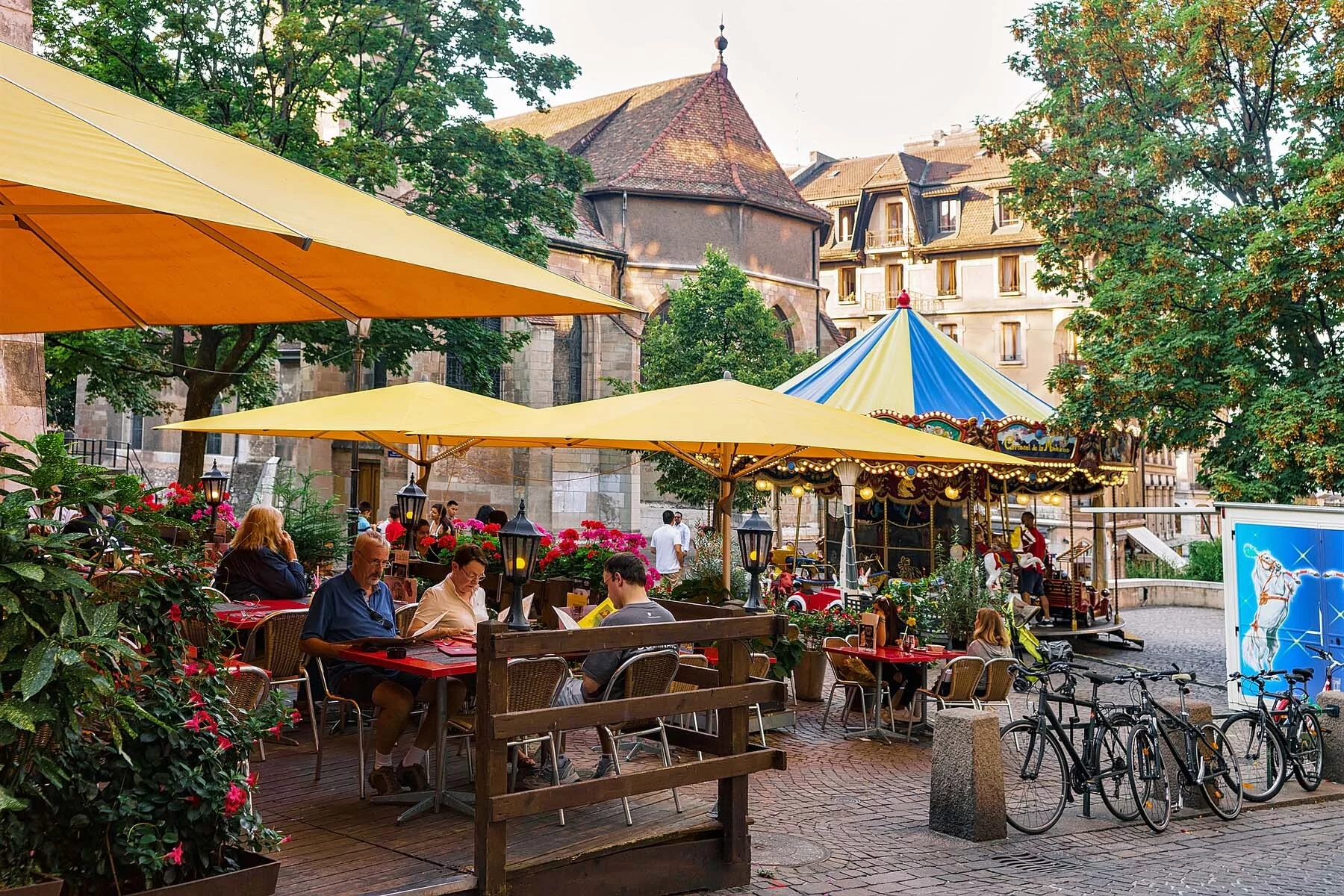
Whatever your drink of choice, Switzerland has all kinds available. White wine is popular with fondue, and beer-lovers won’t be short of options. The average price for a pint of beer in a bar is around CHF 6–7. Switzerland has a variety of vineyards to discover, and a bottle of mid-range wine will cost you about CHF 12, according to a price survey.
A regular cappuccino will set you back, on average, CHF 4.88. This goes up to CHF 5.33 in Zurich – much more expensive than other European capital cities such as London, Paris, and Berlin.
Fitness and gyms
A gym membership in Switzerland is one of the more expensive ones in Europe. Expect to pay about CHF 71 per month. Meanwhile, the average cost of renting a tennis court is around CHF 40. If you want to save money with a one-off purchase, you can buy a pair of running shoes for about CHF 112.
Swiss education and childcare costs
Daycare and nannies
Switzerland has plenty of options for childcare. There are more than 2,000 crèches across the country with the capacity to mind around 50,000 children. But even so, childcare costs in Switzerland do not come cheap.
Crèches are centrally located in city centers for working parents, where higher rent prices generally mean higher child-minding fees. Daycare costs on average CHF 130 per day, and full-time childcare can reach up to CHF 2,600 per month.
The Swiss Red Cross also runs a babysitting program that encourages teenagers to look after young children. The least expensive option is to hire an au pair, whether locally or from abroad. Swiss law only allows au pairs to work for six hours a day.
Children’s education
The state education system in Switzerland is recognized to be one of the best in the world. Public schools are state-funded, meaning tuition fees do not exist. However, as lessons are taught in one of the canton’s official languages, international children who don’t speak French, German, Italian or Romansh can struggle.
There are also bilingual Swiss schools that teach the Swiss curriculum in a local language and English, with annual fees of up to around CHF 30,000 per year. Read more about schools in Switzerland to help you decide.

An alternative option is a private or an international school, which follows international curriculums in native languages. Competition for places is stiff and tuition fees are expensive, ranging anywhere from CHF 25,000 to CHF 100,000 per year. Some expat employees, however, may be able to negotiate education expenses into their employment package. See our guide to international schools in Switzerland.
University education
In contrast, fees for universities in Switzerland are substantially lower and reasonable compared to other leading educational institutions, costing, on average, about CHF 390–3,500 per year. Certain institutions and disciplines will be more expensive than others.
The universities of Fribourg, Lucerne, Neuchatel, St. Gallen, Zurich, and Lugano charge additional fees for foreign students.
How does Switzerland compare to the rest of the world?
Switzerland is one of the most expensive countries in the world – four cities featured prominently in Mercer’s 2024 Cost of Living City Ranking – Zurich (third), Geneva (fourth), Basel (fifth), and Bern (sixth).
The cost of living in Zurich
Zurich is the world’s third-most expensive city and the most expensive city in Europe. Online cost surveyors estimated the total cost of living to be:
- 16.4% cheaper than in New York (US)
- 17.9% more expensive than in London (UK)
- 40.1% more expensive than in Amsterdam (Netherlands)
- 445.8% more expensive than in Delhi (India)
- 105.5% more expensive than in Rome (Italy)
- 79.2% more expensive than in Berlin (Germany)
- 103.9% more expensive than in Lisbon (Portugal)
The cost of living in Geneva
The cost of living in Geneva is ranked as the fourth-highest in the world. Online cost surveyors estimate Geneva’s cost of living to be:
- 18.7% cheaper than in New York (US)
- 14.5% more expensive than in London (UK)
- 36.2% more expensive than in Amsterdam (Netherlands)
- 430.5% more expensive than in Delhi (India)
- 99.7% more expensive than in Rome (Italy)
- 74.2% more expensive than in Berlin (Germany)
- 98.2% more expensive than in Lisbon (Portugal)
The cost of living in Basel
The cost of living in Basel is the fifth-highest in the world. Online cost surveyors estimate Geneva’s cost of living to be:
- 26.2% cheaper than in New York (US)
- 4% more expensive than in London (UK)
- 23.7% more expensive than in Amsterdam (Netherlands)
- 381.7% more expensive than in Delhi (India)
- 81.3% more expensive than in Rome (Italy)
- 58.2% more expensive than in Berlin (Germany)
- 80% more expensive than in Lisbon (Portugal)
Assistance with living costs in Switzerland
Should you find yourself unable to pay living costs due to your circumstances, there is help available in Switzerland. For a full overview, visit our article on Swiss social security. Some of the main benefits you can claim include:
- Family allowance:CHF 200–270 per child
- Maternity/Paternity allowance: 80% of average income (up to CHF 220 per day maximum)
- Old-age pension: CHF 1,225–2,450 (CHF 3,675 for a couple)
- Social assistance: At least CHF 1,031 per month, depending on how many people in the household
- Unemployment benefit: 80% of average pay in the last six months, up to a maximum of CHF 12,350 per month

In the event of losing your job, expats can be entitled to unemployment benefits at a rate of up to 70% of previous salary after one year of working in Switzerland.
Tips for how to save money in Switzerland
- Shop after 17:00 – this can sometimes save a few francs on perishable items that will have been discounted towards the end of the day
- Public transport discount cards – including the annual Swiss Half Fare card which grants almost 50% off all public transport types, or a Junior Card which allows children to travel free with an adult
- Dine out for lunch – this is the time that you can order discount deals from the menu of the day, usually consisting of a starter and a main course
- Consider cooking vegetarian – with Switzerland’s steep meat prices, switching to vegetarian meals when cooking at home can save quite a bit of money
Useful resources
- Swiss government website – economic indicators on price trends in Switzerlands
- Health insurance premium calculator – compare health insurance costs in Switzerland
